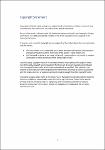Evidence-Based Teaching: discourses of pedagogy and positionality
| dc.contributor.supervisor | Georgeson, Janet | |
| dc.contributor.author | Barry, Jacklyn Irene | |
| dc.contributor.other | Faculty of Arts and Humanities | en_US |
| dc.date.accessioned | 2024-02-26T15:25:12Z | |
| dc.date.available | 2024-02-26T15:25:12Z | |
| dc.date.issued | 2024 | |
| dc.identifier | 10355771 | en_US |
| dc.identifier.uri | https://pearl.plymouth.ac.uk/handle/10026.1/22081 | |
| dc.description.abstract |
This critical discourse analysis (CDA) addresses the gap in research about teachers’ identities in primary schools (Rushton et al., 2023: 15). It does so by drawing upon aspects of Bernstein’s theories of the pedagogic device to explore the impact of evidence-based training practices on teachers’ positionalities in primary schools in one MAT in the South West of England. Using the prompt of brain-based interventions, how the use of research evidence might affect the ongoing development of teachers’ pedagogies was explored. Through interviews with 15 stakeholders in four primary schools, and a document analysis of ten resources related to the themes of Rosenshine’s principles and mastery in mathematics, it was found that there is an inherent drive toward a consistency of teaching approaches. This preference is apparent in professional development training where there is a focus on actions rather than theory and where strategies are justified by drawing upon specific forms of research evidence. Teachers, in fulfilling the expectation that they adhere to the approaches derived from this evidence, evidence which has often undergone multiple recontextualisations, have little opportunity to develop multi-faceted or diverse pedagogies. Moreover, when discussing evidence-based practice, practitioners are seen to make discursive choices to ensure that their language attends to the priorities of politicised educational discourse, a discourse which ultimately constrains and limits the pedagogical thinking teachers are able to engage with. Language choices not only reflect how teachers position themselves within their professional practice but ultimately see them redefining what it means to be a teacher. As such, professional development practices impact teacher identity and, coupled with the changing landscape of ITT, could be laying the foundations for an ill-equipped and thus non-sustainable teaching workforce. This project concludes with the suggestion that, in light of these insights, those who support professional development practices should consider the implications of their training strategies to ensure that teachers are given opportunities to develop individual practices which are aligned with their contexts and their own personal professional development needs. | en_US |
| dc.language.iso | en | |
| dc.publisher | University of Plymouth | |
| dc.subject | Bernstein | en_US |
| dc.subject | critical discourse analysis | en_US |
| dc.subject | multi-academy trust | en_US |
| dc.subject | teacher identity | en_US |
| dc.subject.classification | PhD | en_US |
| dc.title | Evidence-Based Teaching: discourses of pedagogy and positionality | en_US |
| dc.type | Thesis | |
| plymouth.version | publishable | en_US |
| dc.identifier.doi | http://dx.doi.org/10.24382/5152 | |
| dc.rights.embargoperiod | No embargo | en_US |
| dc.type.qualification | Doctorate | en_US |
| rioxxterms.version | NA |
Files in this item
This item appears in the following Collection(s)
-
01 Research Theses Main Collection
Research Theses Main


